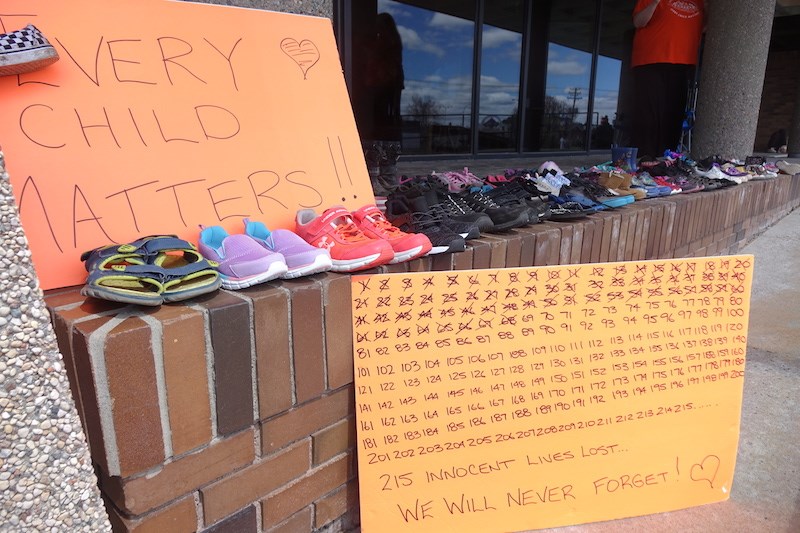The discovery of the remains of 215 Indigenous children at a former residential school in Kamloops, B.C, revealed by the Tk'emlúps te Secwépemc First Nation, which used ground penetrating radar to survey the site, prompted tributes and statements by Indigenous and political leaders and residents of Manitoba over the weekend, including a memorial at Thompson City Hall.
Thompson residents were invited to drop off children’s shoes starting at 2:15 p.m. May 30 to commemorate the lost lives. Fifty-one children are known to have died between 1914 and 1963 at the school, which operated as a Catholic church-run boarding school from 1890 until 1969, and as a day school until closing in 1978. The Truth and Reconciliation Commission said in its 2015 report that government officials in 1918 believed children at the school were suffering from malnutrition as a result of not begin fed properly.
The organizer of the City Hall tribute, who said she preferred not to be named, got the idea after seeing news about similar commemorations in Vancouver and Winnipeg.
“We can’t do much with the public health orders but we can lay shoes and honour them,” she said.
215 pairs of shoes were collected within a few hours.
The flags at City Hall have been at half-mast since May 29, when Mayor Colleen Smook received a couple of requests asking if that would be possible and had Thompson Fire & Emergency Services members lower them.
Flags at School District of Mystery Lake Schools were also lowered to half-mast on May 31.
Manitoba Keewatinowi Okimakanak (MKO) Grand Chief Garrison Settee said the discovery of the remains was a stark reminder of prolonged attempts to wipe out First Nations people in Canada in the name of religion and that the news triggered many emotions and memories among indigenous people who continue to feel the impacts of residential schools in their own families and communities.
“The impact of these schools continues to affect all of us today,” he said on behalf of the organizations he leads, which represents more than 20 Northern Manitoba First Nations. “The healing works needs to continue. MKO will continue to honour residential school survivors and we will continue to remember those children we have lost. I encourage all Canadians to keep learning about this important part of our collective history and to stand with us as we work to heal from the intergenerational trauma inflicted upon us due to the residential school system.”
Manitoba Premier Brian Pallister said he was deeply saddened by the discovery and had the flags at the Manitoba legislature and memorial park lowered and the legislative building lit in orange in honour of the 215 children.
“This discovery reminds us all of the tragedy of the residential school system,” he said in an emailed statement May 30. “We must all remain committed to righting this historic wrong and to ensure that it is never allowed to happen again.”
Assembly of Manitoba Chiefs Grand Chief Arlen Dumas said the premier’s statement should have been issued much sooner.
“While I recognize that the flags were finally lowered to half-mast late Sunday afternoon without any announcement, I ask why it took this long to do so,” he said in a press release. “Why did it take a social media push to shame the government into doing the right thing? This news verifies the fact that this was genocide. Young children and babies were murdered. There is no other way to spin that. These were children that were loved and are still loved and remembered. Families were ripped apart back then. The aftermath is the families still struggling to cope today. Those memories are hard to shake and those stories are being shared now. This was not something to sit silent on, and frankly, the Pallister government’s silence is violence.”
Manitoba’s other political parties said symbolic recognition is important abut that more must be done.
“After the flags have been lowered, we need to commit to the real and hard work of reconciliation, which is an ongoing act of justice, healing, care, and mutual support,’ said Manitoba Liberal leader Dougald Lamont, noting that the number of First Nations children in Child and Family Services care in Manitoba and across the country is the most important legal and moral issue Canada faces. “We must not shy away from it. We have an obligation to forge a new peace, to the benefit of all of us.”
“This is a critical moment in history that demands more than just words of solace – it demands action,” said Manitoba NDP justice critic Nahanni Fontaine in the legislature May 31. “ The provincial government must respond accordingly and make a commitment today to search for mass graves at all former residential school sites in Manitoba.”
Northern Manitoba’s federal representative made a similar demand of the Canadian government.
“The horrific news of the 215 children found at Kamloops Residential School has shaken our region,” said Churchill-Keewatinook Aski NDP MP Niki Ashton in a tweet. “People want searches of the grounds of residential schools their families were abducted to. The Feds must pull out all stops. There must Truth for there to be Reconciliation.”




